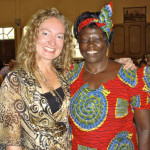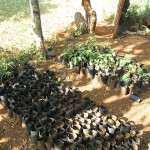"If you destroy the forest then the river will stop flowing, the rains will become irregular, the crops will fail and you will die of hunger and starvation." -- Professor Wangari Maathai
The seeds of Terrawatu started to germinate when Dr. Tanya first met Dr. Wangari Maathai in Seattle in 1999. Trained as an Environmental Sociologist and passionate about conservation, Tanya soaked up Wangari's lessons of how to help slow the surge of deforestation that was happening in Kenya and Tanzania. Rural women cut down large numbers of trees to use for firewood to cook as there was little or no electricity. Knowing that trees are a renewable resource, Wangari mobilized women's groups, with the help of foresters, to cultivate tree nurseries.
Wangari's efforts became known as the Green Belt Movement, and twenty-seven years and thirty million trees later, they were awarded the Noble Peace Prize in 2004. By focusing on planting trees and reforesting the environment, women's groups are empowered, food security improves and the environment gets healthier.
Terrawatu modeled its tree-planting networks after the Green Belt Movement. With an emphasis on cultivating trees for food, medicine, and to provide shade, large areas of Arusha region have been reforested.



